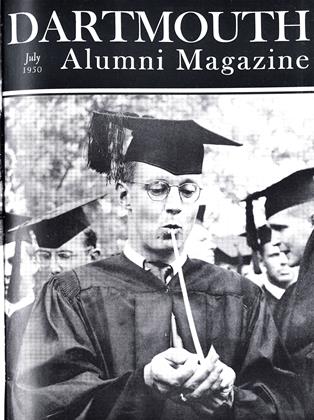by Pennington Haile '24. Ives Washburn, Inc., 1950;194 pages. $2.50.
Pennington Haile's concern with the potentially disastrous effects of the "cold war" and with the inability of the United States and Russia to reach any real agreement by the method of conference has led him to "look back into the well-springs out of which they have drawn their opposing ways of life." In our present crisis, any attempt to gain a deeper understanding of the conflicts in everyday internal and external political and social practices of these two nations is, of course, particularly relevant; and Mr. Haile's thesis that, in the final analysis, they stem from fundamentally irreconcilable political theories grounded in opposing conceptions of man's essential nature seems especially worthy of consideration. In the main, therefore, The Eagle andthe Bear is philosophically oriented and concerned with the ideational roots of present world conflict. Yet Mr. Haile, rejecting a dichotomy of theory and practice, especially in the field of political action, constantly seeks to relate the main development of his ideas to practical issues and, finally, to present a broad program of governmental measures designed to deal "with a situation that deteriorates of its own weight while nothing is done about it."
The Eagle and the Bear sets the stage with a brief description of the philosophic ideas prevalent in the high middle ages and the impact on that world view of modern science. Such an upheaval clearly necessitated a reconstruction in political theory and, even more fundamental, in man's conception of man. The main portions of the book are concerned with two of these: liberal democratic thought in England and America and the ideology of communist Russia.
Relying heavily on the work of F. S. C. Northrup (to whom he gives due credit in the foreword), Mr. Haile seeks to derive and substantiate the basic concepts of our political ideology from the works of John Locke; while he attributes to Hume the justification of major parts of traditional economic theory. He sees the German idealist movement of the early nineteenth century, particularly the work of Fichte and Hegel, as a counterbalance to British empiricism and the main source (with Feuerbach) of marxian communism. Opposed in their basic outlook on the nature of man, democratic and marxian political theory stand irreconcilably opposed in their views on the nature of the state, the freedom of the individual, and the individual's relation to state controls. Commitment to such diametrically different political philosophies inevitably expresses itself in insoluble conflict in political action. But comprehension of the roots of the conflict may be a source of control; and Mr. Haile in his chapter "A Program of Action" formulates measures toward this end.
Issue might be taken with an over-simplified presentation of the sources of democratic thought, with the emphasis given the concept of "will" in marxian philosophy and the lack of clear distinction in structure and source between fascist and marxian totalitarianism, and with the neglect of differences between Marxism and Stalin-Leninism. Yet it must be remembered that The Eagle and the Bear is a "primer" of political philosophy, directed at the current situation and aimed at a wide audience. It has thus already received the praise of Eleanor Roosevelt and August Hecksmer, among others, as "a fascinating and very helpful book," "a lucid and admirably proportioned survey "
 View Full Issue
View Full Issue
More From This Issue
-
 Article
ArticleBaccalaureate Address
July 1950 By THE HON. GEORGE F. KENNAN '50h -
 Article
ArticleThe Fifty-Year Address
July 1950 By LEON BURR RICHARDSON '00 -
 Article
ArticleThe 181st Commencement
July 1950 -
 Class Notes
Class Notes1940's Fast and Furious 10th
July 1950 By JUDSON S. LYON '40 -
 Class Notes
Class Notes1910 Calls 40th "Best Yet"
July 1950 By HAROLD P. HINMAN '10 -
 Article
ArticleDartmouth Awards Honorary Degrees to Ten
July 1950
Francis W. Gramlich
Books
-
 Books
BooksHOW TO SUCCEED AT TOUCH FOOTBALL.
MARCH 1963 By CLIFF JORDAN '45 -
 Books
BooksTHREAD OF SCARLET
May 1939 By E. P. Kelly '06 -
 Books
BooksINTRODUCTION TO ELECTRICAL DISCHARGES IN GASES.
FEBRUARY 1967 By FORREST I. BOLEY -
 Books
BooksWHAT THE OLD-TIMER SAID: TO THE FELLER FROM DOWN-COUNTRY AND EVEN TO HIS NEIGHBOR—WHEN HE HAD IT COMING
JULY 1971 By JOHN HURD '21 -
 Books
BooksTHERMOSTATICS AND THERMODYNAMICS.
February 1962 By JOSEPH J. ERMENC -
 Books
BooksINVESTMENTS: NEW ANALYTIC TECHNIQUES.
APRIL 1972 By WILLARD T. CARLETON '56, T'57



